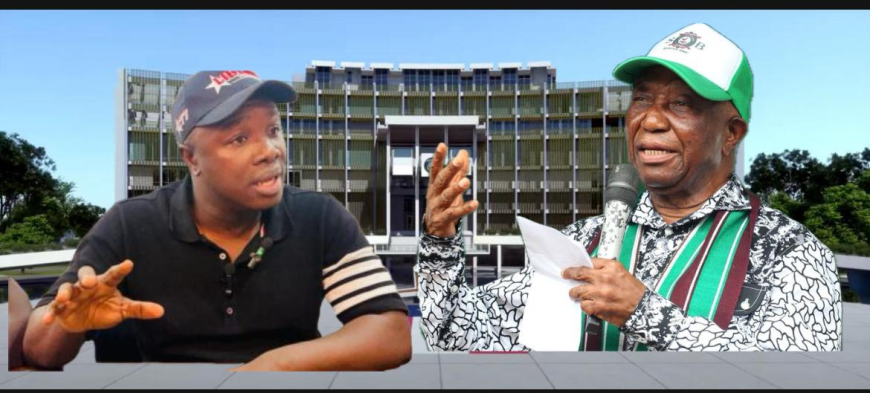Koijee Takes on Unity Party Government; Alleges Rampant Corruption, Human Rights Violations, Among others

Monrovia, Liberia: The former head of the City Government of Monrovia, Jefferson Tamba Koijee, who is also the National Secretary General of Congress for Democratic Change (CDC), has accused the President Joseph Nyuma Boakai Unity Party-led government of corruption, human rights violations, and the misuse of US foreign aid.
In a public communication believed to be addressed to U.S. Donald Trump, Koijee highlighted what he considered the deep-seated issues plaguing Liberia under the Joseph-Koung administration, ranging from urging the U.S. to reconsider its stance and support the Liberian populace in their quest for democracy and accountability.
Liberia, Africa's oldest republic, has a complex history intertwined with that of the United States. Founded by freed American slaves in the 18th century, Liberia has endured periods of civil unrest, economic challenges, and political upheavals.
The recent political landscape saw soccer icon turned politician George M. Weah ascend to the Liberian Presidency in the 2018 Presidential and Legislative Elections, promising reform and development, but six years later nothing much was done to change Liberia’s gloomy outlook.
The Weah-led government faced criticism over allegations of corruption and economic mismanagement, which paved the way at the 2023 ballot box for Joseph Nyuma Boakai, then former Vice President, to win a tightly contested race.
Despite initial optimism, President Boakai's administration has been marred by scandals and controversy.
However, in a bold move against corruption, President Boakai recently suspended over 450 government officials for failing to declare their assets, a legal requirement aimed at promoting transparency.
Among those suspended were key figures such as the ministers of education and health. This action was part of a broader campaign to address systemic corruption that has long hindered Liberia's progress.
On the other hand, critics have argued that these measures are superficial and fail to address the root causes of corruption.
Koijee seems to be in agreement with a political pundit who thinks Boakai's professed commitment to fight corruption is nothing short-lip service, a key point highlighted in Koijee’s communication to President Trump.
Koijee alleges in his letter that under the Boakai-Koung leadership, there have been significant financial discrepancies, including unaccounted miscellaneous expenses amounting to US$2.3 million and off-budget expenditures totaling US$15 million. Such allegations, if proven true, paint a grim picture of the current administration's commitment to genuine reform.
He also accused the government of perpetuating human rights violations, mentioning references to over a hundred reported cases of mysterious deaths within a year. Koijee linked these deaths to alleged state-sponsored persecution, police brutality, and ritualistic killings.
Koijee’s claims, coupled with reports of violent crackdowns on opposition parties and the arbitrary dismissal of dissenting voices, suggest a shrinking space for political freedom and civil liberties in Liberia.
The U.S. government has historically been a significant ally and donor to Liberia, providing substantial aid aimed at fostering development and democracy. However, concerns about the misuse of these funds have remained pervasive.
The former City Mayor referenced instances where U.S. aid, such as the US$17 million tax advisory project, was allegedly mismanaged, leading to minimal tangible benefits for the Liberian populace.
According to him, it calls for a comprehensive investigation into the allocation and utilization of previous United States Agency for International Development (USAID) grants to ensure that American taxpayer money is used appropriately and effectively.
Another issue raised in Koijee’s communication is the potential deportation of 1,563 Liberians residing in the United States. Many of these individuals fled political persecution and have since contributed significantly to both the U.S. economy and Liberia's development through remittances.
Koijee urges President Trump to reconsider these deportations, emphasizing the dangers these individuals would face upon return, given the current administration's alleged human rights abuses.
However, the Boakai administration has dismissed many of these allegations as politically motivated. In official statements, the government emphasizes its commitment to combating corruption and promoting transparency.
For instance, the government named the suspension of officials who failed to declare assets as evidence of its commitment to foster transparency and accountability in public service.
The allegations presented by Jefferson Koijee serve as a clarion call for introspection and action, as it is imperative for the Boakai-Koung administration to address these concerns transparently, ensuring that the principles of democracy, human rights, and accountability are upheld.
Editied: E. Geedahgar Garsuah, Sr.
What's Your Reaction?









































































